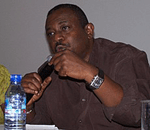Civil society groups urge UN to address multiple global crises
Published on Tue, 2012-04-24 09:05
Civil society groups taking part in UNCTAD XIII that is been held in Doha called on the UN and its member countries to pursue a "fundamental shift" in economic and development paradigms in order to address the multiple global crises, reported the Kuwait News Agency (KUNA). The United Nations Conference on Trade and Development (UNCTAD) must address in its 13 edition the global inequality, and the entrenchment and intransigence of the masters of the universe that are the greatest structural anomaly afflicting the global order, pointed experts and activists on April 19 in the Civil Society Forum Declaration in Doha. The declaration called for a "major paradigm shift based on holistic visions and new measures of progress," said the experts. They urged reversal of "negative effects of years of economic orthodoxy and neoliberal policy" by rethinking macro-economic policies, re-regulating the financial sector, more effective global and domestic taxing system, and more sustainable production systems and technology, transformative social protection, in addition to placing human rights as a key ingredient of policy formulation. Gyekye Tanoh, of Third World Network-Africa, said that effects of the global crisis were seen much more devastatingly on the vulnerable population everywhere in the world, noting that "working people have suffered from deprivation in terms of their share of income and social investments”. "Unless the financial system, which has become out of control, becomes subsumed to the real economy and to the needs of people, people all over the world will increasingly pay the burden and the cost of this crisis," Tanoh said. Ziad Abdel-Samad, of the Arab NGO Network on Development, said the world was facing multidimensional crisis and that the United Nations Conference on Trade and Commerce (UNCTAD) must address in its 13 edition the climate, the economic and the financial crisis. He added that the world was troubled by the fact that 20 percent of population own 70 percent of revenues and the bottom 20 percent have access to two percent of income. "The continuation of this situation without proper solutions and interventions was the main reason of the wave of the popular and democratic movements across the world, and in particular in this region [the Middle East], since the beginning of 2011," Abdel-Samad said. Meanwhile, UNCTAD Secretary General Supachai Panitchpakdi called for a globalization with human features which must provide job opportunities for the youth and women, and achieve balanced growth for all the countries. The UNCTAD Chief stressed the importance to invest in manpower to reinforce development policies worldwide, considering that the poor humanitarian situation and inequality were the core factor for the Arab Spring. Patitchpakdi pointed out that growth was linked to other issues and not only trade. He also called for a thorough analysis of economic issues and the need to deal with the elements of productivity in a way to enhance growth. The only way to get out of economic problem was the reduction of interest rates and the devaluation of the currency, he added. Source » |




